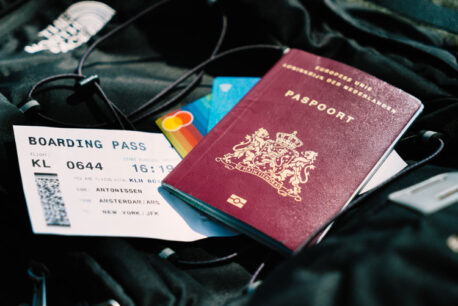Canadians travelling to Europe: requirements and travel tips
Canadians travelling to Europe: requirements and travel tips

Visiting Europe is a once in a lifetime trip that many Canadian travellers choose to experience at some point and often entices visitors back more than once. With so many countries, cultures and characteristics, Europe has something for everyone.
-
- If you need updated information about if Canadians can travel to Europe we recommend you the following article:
So what do Canadians need for entering Europe and what are the visa and travel requirements?
At present, Canadian nationals can visit Europe for touristic and business purposes without a visa, providing that it’s a short stay. In November 2023 a new system will be implemented and travellers will need to apply for an ETIAS before travelling to Europe. ETIAS is not a visa but an electronic authorisation. However, it will still become mandatory to have one before entering the Schengne Area.
Travel to Europe from Canada: new travel requirements
ETIAS (European Travel Information and Authorisation System) is a new system that will take effect in November 2023, with the aim to improve security measures throughout Europe and create a safer travel environment. It is also expected to make document checks at the border quicker and smoother for visitors.
Once ETIAS is implemented, travellers will have to request an ETIAS visa waiver in order to visit European countries within the Schengen Area or countries in process of joining Schengen such as Bulgaria, Croatia, Cyprus, and Romania. This means that citizens from Canada will have to be authorised to enter Europe through the ETIAS system.
Please note: travel restrictions and safety measures will also be heightened for Canadians travelling to Europe regarding objects such as perfume, alcohol, currency and more.
What are the necessary documents for Canadians applying for an ETIAS?
Canadian nationals will require a valid passport, valid credit or debit card and an email address in order to request an ETIAS visa waiver. The processing fee can be paid with a secure credit or debit card at the time of completing the online application form.
It is essential that applicants follow the list of necessary requirements in order to apply for an ETIAS. Failure to provide the correct information or the required documents could lead to delays in the processing of one’s travel authorisation for Europe.
How can Canadian citizens apply for an ETIAS?
The visa waiver allows for visits to Europe for up to 90 days and can be requested electronically making the process of obtaining travel permission for the Schengen Area much smoother.
Canadian nationals who are 18 years old and under will also have to apply for an ETIAS, although, they will be exempt from the ETIAS application fee.
Thanks to ETIAS, Canadians will be able to see all European member states which form the Schengen Area, and also countries in process of joining Schengen (Bulgaria, Croatia, Cyprus, and Romania). More than 50 different nationalities will be required to enter these European countries with an authorised ETIAS as of November 2023.
The current amount of countries permitted to enter with an ETIAS may be set to change, as it is anticipated that more nations will be incorporated into the system over time.
The ETIAS program is set to begin as of November 2023 and will affect all eligible travellers entering Europe. The process is designed to be simple and accessible for all who those eligible who wish to visit the continent.
Can Canadians go to Europe? Travel health certificate & vaccines

After the introduction of travel health certificates, Canadians were able to travel to Europe from Canada during COVID with fewer entry requirements.
Travel health certificates show whether an individual has been vaccinated, had a PCR test, or recovered from COVID-19. They were used by European nations to allow safe international tourism.
However, now the majority of the restrictions for travelling to Europe from Canada during COVID have been removed. This article explains the current rules and upcoming requirements, such as the need to have an ETIAS for Canadian citizens.
Can I travel to Europe from Canada during COVID-19?
Canadians can go to Europe now, whether or not they have a vaccination certificate. COVID requirements to enter Europe from Canada have now largely been lifted for all countries.
Some EU countries started welcoming Canadian tourists with a travel health certificate showing full vaccination in early 2022. However, now Canadians can travel to the EU without any vaccination or testing requirements.
Nevertheless, as each EU nation has different rules, Canadians should check the restrictions for the country they wish to visit in case of any changes in entry policy.
When can Canadians travel to Europe?
It is now possible to travel to Europe from Canada for any purpose or length of stay, as most EU covid entry requirements have now been abolished.
Can I travel to Europe without a vaccine?
Yes, non-vaccinated Canadians can go to Europe now without having to present any documentation. It is no longer necessary to show proof of a vaccination certificate to enter the EU.
Do you need proof of vaccinations for Europe?
No, as indicated above, Canadians can travel to Europe without a vaccine. They no longer need to show any health documentation.
Where can Canadians travel to in Europe?
All of the most popular European tourist destinations are now welcoming Canadian visitors without restrictions.
Passengers must simply meet the normal entry requirements which involve having a valid passport. From November 2023, it will also be necessary to submit an ETIAS application from Canada in advance of travelling to Europe.
Has the pandemic affected European visa policy for Canadians?
No, Canadians are able to travel to Europe as normal now that the remaining EU COVID entry requirements have been abolished.
Canadian citizens need a valid passport to travel to Europe for up to 90 days per 180-day period.
However, November 2023, Canadian nationals will need to complete an ETIAS application form online prior to travelling in order to enter the EU.
To obtain this travel authorisation, the applicant must meet the ETIAS requirements for Canadians. The online form will be quick and easy to complete and can be done from anywhere with an internet connection.
ETIAS is not a visa and will not change Canadians’ visa-free status.
ETIAS is expected to improve security for both European citizens and international visitors.
Can Canadians travel to France?
Yes, Canadians can travel to France without restrictions. French COVID entry requirements were lifted on 1 August, 2022.
Canadians may go to France whether they have been vaccinated or not, and do not need to show proof of a negative COVID test or proof of recovery.
Can Canadians fly to Germany
Yes, Canadians can travel to Germany.There are no longer any restrictions on travelling to Germany from Canada.
Can Canadians travel to Greece?
Yes, Canadians can travel to Greece now. COVID entry requirements for Greece were lifted on May 1, 2022.
Can I travel to Italy from Canada?
Yes, Canadians can travel to Italy. Entry restrictions for Italy from Canada were removed on June 1, 2022.
Can Canadians travel to Portugal?
Yes, travel to mainland Portugal from Canada is now unrestricted. All COVID entry requirements were abolished on 5 July, 2022.
Can I travel to Spain from Canada?
Yes, Canadians can travel to Spain without restrictions. Additionally, Canadians can fly to Spain without having to go through COVID health checks on arrival, as these ceased on 24 October 2022.
Remember that entry rules and restrictions are still subject to change. Canadians should ensure they have all the latest information before making any arrangements.
Related News

Countries Canadian passport holders can visit visa-free
The Canadian passport is one of the strongest passports in the world. Canadian citizens can travel to many countries without applying for a visa, [. ]

Biometric passports for Canadians visiting Europe
Biometric passports are becoming more and more common for international travel. These modern documents employ digital technology to provide greater security and efficiency when [. ]

Will Canadians need ETIAS to visit Croatia from 2023?
Currently, the Schengen Area is made up of 22 EU member states and 4 non-member states of Iceland, Liechtenstein, Norway, and Switzerland. Although Croatia joined [. ]
What You Need to Travel to Europe in 2023
With Europe now open to international visitors, many travelers are looking forward to taking their first trip in 2022. However, overseas travel is different since COVID-19, and there will be more changes to European entry requirements in the future.
This brief guide explains what you need to travel to Europe in 2022, including visas and COVID-19 documents.
Remember that entry restrictions and requirements are being updated regularly. Make sure you have all the latest information before arranging travel to Europe.

Passports and Entry Permits to Travel to Europe
Pre-pandemic, there was one key document to travel to Europe—a valid passport.
If you’re an American or Canadian citizen, you can enter the Schengen Area with just a passport and explore 26 countries for up to 90 days visa-free. This remains the same despite COVID-19. However, you’ll also need the additional COVID-19 documentation explained below.
Europe’s Entry Requirements for Americans, Canadians, and other visa-exempt countries will change
Europe’s entry requirements for Americans, Canadians, and other visa-exempt countries will change at the end of this year. You’ll soon need an electronic travel authorization called ETIAS to visit European destinations.
The exact launch date has not yet been announced. It was originally slated to go into effect in late 2022. However, the European Union has postponed the launch of the European Travel Information and Authorization System (ETIAS) to November 2023. There’ll be a short implementation period before the visa waiver becomes mandatory to travel to Europe visa-free on an American or Canadian passport.
It’s important to point out that this is not a visa. The new permit is similar to the United States ESTA, you’ll be able to register online in a few minutes. To find out if you’re eligible, check here.
Passport holders from other countries still require a Schengen visa for their vacations in Europe. Visas are also required for stays of over 90 days.
Vaccine Certificates to Travel to Europe
The European Union recommends that Member States progressively reopen to international travel. According to EU guidelines, people fully vaccinated with vaccines authorized by the European Medicines Agency (EMA) should be able to visit Europe for any purpose, including on vacation.
Although each Member State is responsible for its borders and sets its own entry restrictions, many countries follow these rules. Favorite European tourist destinations such as Spain and Italy are now open to tourists from around the world.
Vaccines approved by the EMA are Comirnaty (BioNTech and Pfizer), Nuvaxovid (Novavax), Spikevax (Modern), Vaxzevria (AstraZeneca), and COVID-19 Vaccine Janssen.
Several EU Member States also accept vaccines approved for emergency use by the World Health Organization (WHO).
Your vaccination certificate must include the type of vaccine received and the dates of each dose. Other key information includes the country where the vaccines were administered and the certificate issuing authority.
It’s important to check the specific vaccine certificate requirements for the country you want to visit. In particular, the accepted vaccines and how many days before travel you need to have received the last dose (usually 14).
Some countries accept a recovery certificate instead of proof of vaccination. A vaccine passport is required to enter some public spaces in Europe. In Spain, you’ll need to show a valid document to enter restaurants.

Passenger Locator Forms
This document goes by several names: passenger locator form, travel health certificate, electronic health declaration, etc. Many European countries now require passengers to fill out an online form before departure.
This form allows nations to screen visitors for health risks before they cross the border. It also facilitates contact tracing. You’ll typically have to provide information about your recent travel history and where you will stay during your visit. Contact information is also requested.
Travel health forms must be submitted 48 to 72 hours before arrival. Where required, you’ll need to present the QR code or pass before boarding a flight to your destination.
European countries with obligatory passenger locator forms in 2022 include Belgium, Croatia, France, Greece, Portugal, and Spain, amongst others. If you plan to visit more than one country on your trip to Europe, be aware that a different travel health certificate is required for each country.

COVID-19 Test Results to Travel to Europe
The document you may need to travel to Europe in 2022 is a COVID-19 test certificate showing a negative result.
Whether you need a COVID-19 test for Europe depends on your vaccination status and the country you are visiting. You don’t need a pre-departure test to visit countries including Latvia and Spain if you’re fully vaccinated.
If you need a test to travel you must check the type of test required (for example, PCR or antigen), and soon before departure you should take the test.
A test certificate showing the date and time of the test, the type of test carried out, and where the certificate was issued is essential.

Europe 2022 Document Checklist
To summarize the requirements explained above, here is a checklist of what you may need to travel to Europe this year:
- Valid passport
- ETIAS visa waiver (from late 2022)
- Schengen visa or another relevant visa (from non-exempt countries)
- COVID-19 vaccination certificate (or recovery document)
- Passenger locator form
- Negative COVID-19 test result
Despite the additional requirements, Europe is accessible to tourists in 2022. Just allow extra time to arrange your documents, and always double-check the latest requirements.
Go World Travel Magazine is a digital magazine for world travelers. Each week, we bring you new travel videos, articles and travel tips on destinations in more than 90 countries.
Source https://www.etias.ca/canadians-requirements-to-travel-to-europe/
Source https://www.etias.ca/can-canadians-travel-europe/
Source https://www.goworldtravel.com/what-you-need-travel-europe-2022/#:~:text=Pre-pandemic,%20there%20was%20one%20key%20document%20to%20travel,days%20visa-free.%20This%20remains%20the%20same%20despite%20COVID-19.